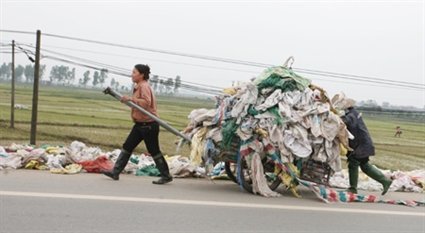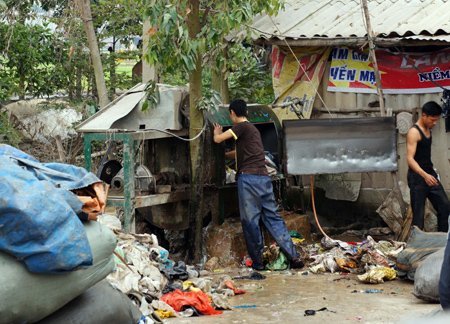
In the last 4-5 years, anyone who travels through the National Highway 32, the section crossing Phung Thuong commune in Phuc Tho district, is flabbergasted when they see plastic bags of all colors covering along the roadsides, rural roads, around the field, all over the local football ground, the rubbish dump and over the big-sized panel with the sologan “Maintaining the environment” and “Building a green-clean-beautiful hometown.”
Several factories that have stopped operating, which are locked--are also salvaged by locals to dry smelly plastic bags. Rubbish covers the national highway, causing a lot of accidents. Refuse washing machines run noisily, discharging waste water to Tay Ninh canal.
Phung Thuong is now a land of rubbish, in the literal sense. The commune’s Chair, Mr. Nguyen, sighed and said: “Many Hanoi’s officials who traveled through the National Highway 32 called us to criticize us about why the local authorities leave this area so dirty. There is more rubbish in this area than in a rubbish dump. The world is trying to reject waste from living; why do we leave our people to live in mountains of plastic bags?”
He explained: “We collect waste very professionally. We built a rubbish dump to store waste before it is transported to waste treatment plants by specialized trucks. We have 13 rubbish collecting teams for 13 residential groups. The things the city officials thought that were refuse discharged by us are plastic bags collected by the local people to wash and pack then sell to traders.”
According to this local official, Phung Thuong people began to do this polluting job for 4-5 years. They collect plastic bags from rubbish grounds to wash, dry, pack and sell to waste traders.
However, to earn several tens of thousands dong (several USD) a day, they have to work hard and live in toxic environment while cause pollution for their hometown. This exchange is merciless.
Mr. Nguyen said that the local government called local people for giving up this job but they did not obey. Recently, the local authorities punished several people to set examples. However, what is happening in Phuong Thuong is fearful.
When correspondents attempted to approach close to a plastic bag washing machine, which was making an ear-splitting noise and discharging black water to Tay Ninh canal, a group of men hindered and insulted correspondents.
The local authorities were not surprised because they knew that ‘waste washers’ had to protect their means of support. Despite of local government’s efforts to control the situation, local residents keep collecting used plastic bags to wash and dry them everywhere and sell them to traders from the neighboring province of Hung Yen, to earn merely VND3,000 ($0.15) per kilo. Traders only purchase clean and dry plastic bags, to recycle into plastic items.
Terrible job

A local official, Mr. Duong Van Thiet, said there are over 50 out of 200 households in his hamlet earn their living by collecting and washing used plastic bags. In Phung Thuong as a whole, more than 13,000 people do this job. On average, each of them collects around 30kg of used plastic bags a day. Thus, Phung Thuong communes has 1.5 tons of rubbish each day. Anyone can see the Tay Ninh canal being polluted with their eyes.
The truth is the commune authorities have never imposed high fines on anyone for polluting the environment. The highest fine is up to VND2 million ($100), which is tiny. Local officials said that it was very difficult to deal with this situation. Meanwhile, the Natural Resources and Environment Division of Phuc Tho district promised to take tough measures.
At the same time, this land is being polluted each day. Tay Ninh canal is flooded by mud and waste so it cannot performs its function of carrying flood water to the river. Last year, Phung Thuong people lost their crops because of flood. It is highly possible that the underground water in this area has been polluted. The people who do this job and the local community are surely affected by this job.
An environmental worker in Phung Thuong said: “My job is also collecting rubbish but my job is a thousand times cleaner than waste washers. They directly climb up waste mountains at rubbish grounds to dig up to search for plastic bags without any safety working clothing. They bring plastic bags home to wash. Water discharged from these bags is smelly like dead animals.”
Plastic bag collectors were very shy to talk about their job. Some cried and said: “If you write about me, my children will be ashamed. I do this job as a last extremity. I and my husband do this job. We leave home at 3am to rubbish grounds in Hanoi. This job is dirty and toxic, I know but if we had money to buy safety working clothing, we would have to do this job. It is ashamed to earn money! I have to search for plastic bags by digging up maggots, dead animals…”
Phung Thuong commune’s chair said that it is very difficult to convince them to give up this job, which helps them earn several tens of thousand a day.
Another local official, Mr. Duong Van Thiet, said that if people do not use plastic bags and do not recycle plastic bags, Phung Thuong will not have this job.
Lao Dong